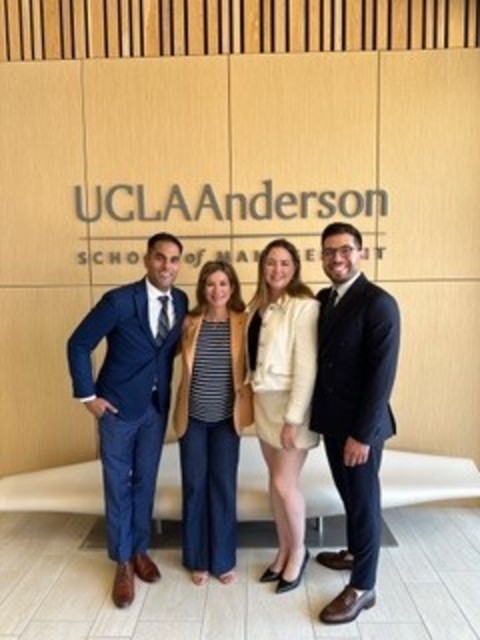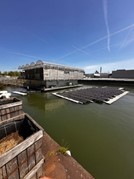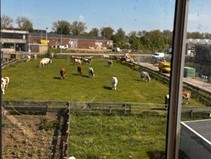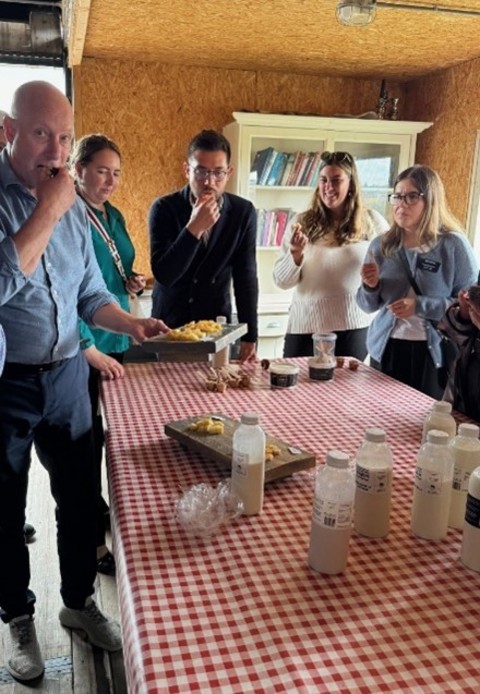Exploring the Viability of Floating Farm in Los Angeles: A Circular Urban Agriculture Model for Climate-Resilient Cities

(Floating Farm, NETHERLANDS / USA)
Floating Farm, the world’s first floating agricultural platform, was founded in Rotterdam as a response to the vulnerabilities of urban food systems exposed by natural disasters like Hurricane Sandy. The farm operates on a three-tiered barge that integrates dairy production, water filtration and circular waste management. It exemplifies a self-sufficient, closed-loop system that produces fresh milk, yogurt and cheese while recycling manure and rainwater and generating renewable energy. The project prioritizes animal welfare, sustainability and innovation, and serves as both a food production site and an educational hub.
Inspired by a visit to the Rotterdam site during the CGM’s global immersion in September 2024, EMBA classmates Tasha Hall and Emerson Haro initiated an SMR project to explore the feasibility of bringing this model to Los Angeles, a county with a vast urban landscape and diverse population, which presents an opportunity for the expansion of urban architecture. The team — comprising Hall, Haro, Anish Godhwani and Jasmin Riley — conducted over 100 hours of primary and secondary research, including stakeholder interviews, regulatory analysis and consumer surveys. Their objective was to assess the strategic, financial and regulatory implications of launching a Floating Farm in Los Angeles, a city facing mounting challenges related to drought, food insecurity and urban sprawl.
The team’s research revealed strong consumer demand for locally grown, sustainable produce, with over 84% of surveyed Angelenos expressing willingness to purchase from a floating farm, and over half willing to pay a premium. However, the regulatory landscape proved complex. Zoning restrictions, environmental regulations and jurisdictional fragmentation across LA’s 88 municipalities presented significant barriers. The team identified AltaSea, a nonprofit ocean innovation campus at the Port of Los Angeles, as a critical partner. AltaSea’s existing infrastructure and relationships with regulatory bodies could reduce permitting timelines from over two years to 18 months, making it the only viable entry point for the project.
In addition to its commercial and environmental promise, the Floating Farm model offers a compelling platform for community engagement and education. During their visit to the Rotterdam site, students toured the dairy processing facilities and cheese maturation rooms, gaining firsthand insight into the farm’s operations. They also participated in tastings of the farm’s fresh milk and cheeses, which brought the project’s mission to life in a tangible and memorable way. This immersive experience underscored the potential for Floating Farm to serve as a living classroom in Los Angeles — one that could inspire future generations, support STEM education and foster a deeper connection between urban residents and their food systems.
The project also aligns with broader global sustainability goals, including the United Nations Sustainable Development Goals (SDGs), particularly those focused on zero hunger, sustainable cities, responsible consumption and climate action. By reducing food miles, utilizing renewable energy and promoting circular agriculture, Floating Farm represents a scalable model for climate-resilient urban food systems. The team’s work not only evaluated the feasibility of this model in Los Angeles, but also contributed to a growing body of research on how cities can adapt to environmental and social pressures through innovative, community-centered solutions.









